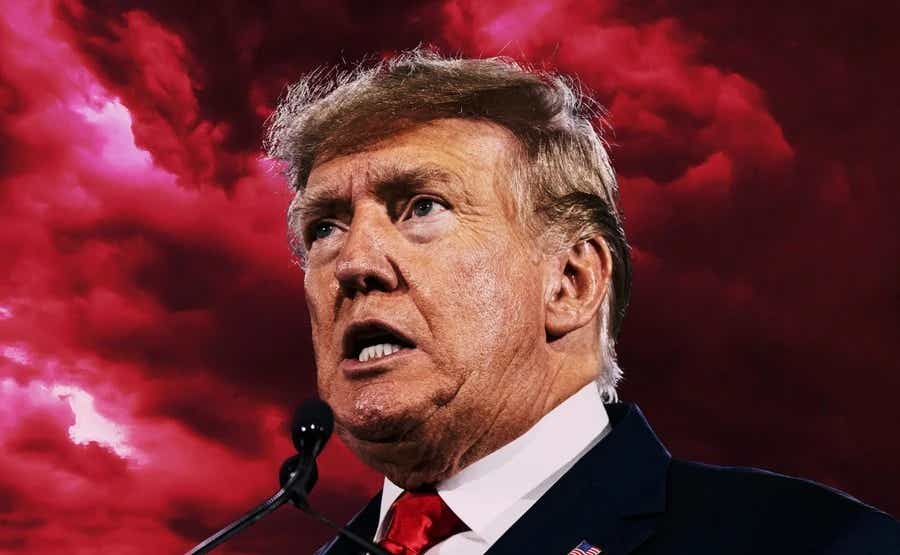After months of speculation, a historically unprecedented decision has finally been reached: Donald Trump will officially be the first former president to face criminal charges.
A Manhattan grand jury has voted to indict Trump with more than 30 counts related to business fraud, a source tells CNN. The exact details of the charges aren't yet known, but the DA's office has been investigating Trump for his role in paying $130,000 in hush money to porn-star-turned-cultural-icon Stormy Daniels.
The felony indictment will likely be announced in the next several days. Here's what we know now.
What's Trump saying?
Trump has reacted with all the temperance we've come to expect. He's released a defiant statement calling the decision: "Political Persecution and Election Interference at the highest level in history."
"From the time I came down the golden escalator at Trump Tower, and even before I was sworn in as your President of the United States, the Radical Left Democrats — the enemy of the hard-working men and women of this Country — have been engaged in a Witch-Hunt to destroy the Make America Great Again movement," he wrote. "You remember it just like I do: Russia, Russia, Russia; the Mueller Hoax; Ukraine, Ukraine, Ukraine; Impeachment Hoax 1; Impeachment Hoax 2; the illegal and unconstitutional Mar-a-Lago raid; and now this."
Trump also posted on Truth Social blasting the indictment in all caps as "an attack on our country the likes of which has never been seen before. It is likewise a continuing attack on our once free and fair elections."
Can Trump still run for President now?
Probably, yes. But it's more complex than some pundits might have you believe. Trump has made it clear that he doesn't intend to drop out of the race, and there's nothing in the Constitution that says he'd be disqualified if convicted. But there is an argument to be made against him running.
"In general, you don't have a right to vote if you're in jail, or you're a convicted felon," explains Neal Katyal. "And so if you don't have the right to vote, you don't have to be the right to be voted for — is the way the argument would go. So I think that it's certainly not squarely in the text of the Constitution, but lots of things aren't squarely in the text of the constitution, but we haven't tried them.
I think if he is serving a criminal sentence, I don't think he could run for office or be elected at that moment. If he's done his time, and there isn't some sort of disenfranchisement law in the relevant state which he's in, then you know, his rights could be restored at that point."
Speaking to Katie just hours after the news of Trump's indictment, Katyal also explained whether we'll see the former president in handcuffs, the legal hurdles still facing the prosecution, what these charges mean for the other investigations mounting against him, and much more. Watch the full conversation, below.
What does Mary Trump, the former president's niece, think of his indictment?
Literally minutes after this news broke, Katie connected with Mary Trump, the daughter of Fred Trump Jr. (the former president's brother), to find out what she thought about this long-awaited but nonetheless shocking development. She said that "anybody who has been a victim of Donald Trump should feel vindicated tonight." She also shared her insights on how he may be feeling right now — and why we need to be very, very wary of his next moves.
Take a look at her full reaction to this major news, below:
What might Trump's indictment look like?
But what does an indictment mean, exactly? And what might happen next? New Yorker columnist and author of The Divider: Trump in the White House, 2017-2021 Susan Glasser joined Katie last week to share the answers to all these questions, and much more.
As dramatic as this process will undoubtedly be, anyone expecting to see photos of the former president doing a perp walk is likely to be disappointed.
"We're not going to see Trump shackled and handcuffed doing the perp walk in an orange jumpsuit, if it proceeds as other recent white-collar prosecutions have," says Susan Glasser, New Yorker columnist and author of The Divider: Trump in the White House, 2017-2021.
What's more likely, according to Glasser, is that "Trump's lawyers would negotiate with the Manhattan DA for a time and place of his surrender. He would then get a mugshot, which certainly would become an iconic photograph of Donald Trump. He would probably fly to New York, in order to surrender."
Check out the full conversation, including more insights from Glasser, below.









